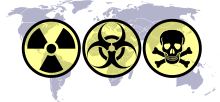
The Algerian Nuclear Program was launched in 1981 with the cooperation of Argentina first, then the cooperation with the Chinese People's Republic[1]. Algeria has since denied developing a military nuclear program and signed the treaty of non-proliferation of nuclear weapons in 1995. Although, some sources such as the Centro Nacional de Inteligencia espagnol estimate in 1998 that "Algeria had the intention to produce enriched Plutonium for military purposes, a material capable of producing a nuclear weapon.[2]".
In 1991, the government of the United States said it had unearthed details of the alleged construction of a nuclear reactor in Algeria.[1] The Washington Times accused the country of developing nuclear weapons with the help of the Chinese government.[1] The Algerian government admitted it was building a reactor but denied any secrecy or military purpose.[1] Surveillance from U.S. satellites also suggested that the reactor would not be used for military purposes.[1]
In November 1991, Algeria placed the reactor under IAEA safeguards.[1] Algeria signed the Nuclear Non-Proliferation Treaty in January 1995, and ratified the Chemical Weapons Convention[3] In August 2001, Algeria acceded to the Biological Weapons Convention.[4] Algeria signed the Treaty on the Prohibition of Nuclear Weapons on 20 September 2017, but has not ratified it as of August 2022[update].[5]
- ^ a b c d e f "The Nuclear Vault: The Algerian Nuclear Problem". Gwu.edu. Retrieved 2013-03-14.
- ^ Jeffrey Fields, Jack Boureston (2009). "Country Profile: Algeria". sipri.org. Stockholm International Peace Research Institute.
{{cite web}}: CS1 maint: url-status (link) - ^ "Member States of the Organisation for the Prohibition of Chemical Weapons". OPCW. Retrieved 2013-03-14.
- ^ "BWC (Algeria)". unhq-appspub-01.un.org. Archived from the original on 8 July 2012. Retrieved 26 January 2022.
- ^ "UNODA Treaties". treaties.unoda.org.
